Back to the roots: N. Chandrasekaran (in blue shirt) in front of his ancestral house at Mohanur village in Namakkal, Tamil NaduN. Chandrasekaran’s journey to the biggest corporate job in India started from a small village in Tamil Nadu
The heart of Mohanur is the agraharam in the middle of it. The tiny village on the banks of the Cauvery in Namakkal is as nondescript as any of them in western Tamil Nadu. But Mohanur now has a new landmark—vakeel veedu, or lawyer’s house. On January 12, a humble boy who lived in this house was catapulted to the most powerful corporate job in India, the chair of Tata Sons.
The typical Tamil Brahmin house with a long thinnai (raised platform in front of the wall) on either side of the front door and a thatch-and-tile roof, however, did not give away any indication of its new status until two luxury cars, a black Audi and a black Jaguar, broke the pleasing silence in the evening of January 15. Clad in a pair of navy blue trousers and a blue printed shirt, a calm and composed man got off the Jaguar, and every man and woman in the agraharam stepped out to get a glimpse of him. He threw a pleasing smile to everyone as he went to the other side to help his father get off the car. In seconds, the agraharam became a place of happiness as people kept coming in to greet him, congratulate him and and take selfies with him.
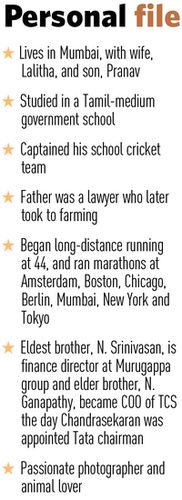
Natarajan Chandrasekaran, 53, moved out of Mohanur some three decades ago, but it is still the place he calls home. It was here Chandra, as he is called in Mohanur and in the entire corporate world, was raised with five siblings, imbibing the ethics and beliefs of a typical middle-class family. “He is extremely grounded and genuinely a great human being. His confidence, his ability to pace himself as per the situation and act accordingly, is what has always taken him forward,” said his brother N. Srinivasan, who is finance director at Murugappa Group.
Chandra’s father, S. Natarajan, was a lawyer in the Madras High Court and his mother, Meenakshi, a homemaker. Natarajan and family returned to Mohanur after the sudden death of his father to look after the family’s farmland.
Many of Chandra’s qualities are attributed to his upbringing in the village. “He does not believe in shortcuts,” said N. Murali, who was his classmate in Mohanur. “He knows there are no shortcuts in life. He believes in being straightforward and taking the straight route to success.” And he has always been a go-getter. “He would never hesitate to travel the extra mile to achieve what he has to,” said his cousin G. Ajeethan.
Ajeethan, a banana farmer, was Chandra’s senior at the Government School in Mohanur. He recalled an incident in school, which could probably have shaped Chandra’s inclusive nature. In the sixth grade Chandra underwent a surgery and could not attend school for two weeks. During this time, a teacher, Kannammal, wrote notes for him. “We had such good teachers who imparted good qualities to us. Chandra was very happy at that time. This was when he learnt to take care of people and work together,” said Ajeethan.
Chandra has an extraordinary capability to remember people, which helps him give a personal touch in his meetings as a corporate leader. This plays a great role in the way he manages clients. He has never attended a management school, but he learns lessons from life to manage people and business. During his brief visit to Mohanur—his first after being elected to the top post in Tata Group—on the day of Maattu Pongal (a festival celebrated in Tamil Nadu on the next day of Pongal to pay respects to agriculture and cows), he shook hands with every person he met as he walked down the narrow, 800-metre-long lane in the agraharam to pray at the temples in the village.
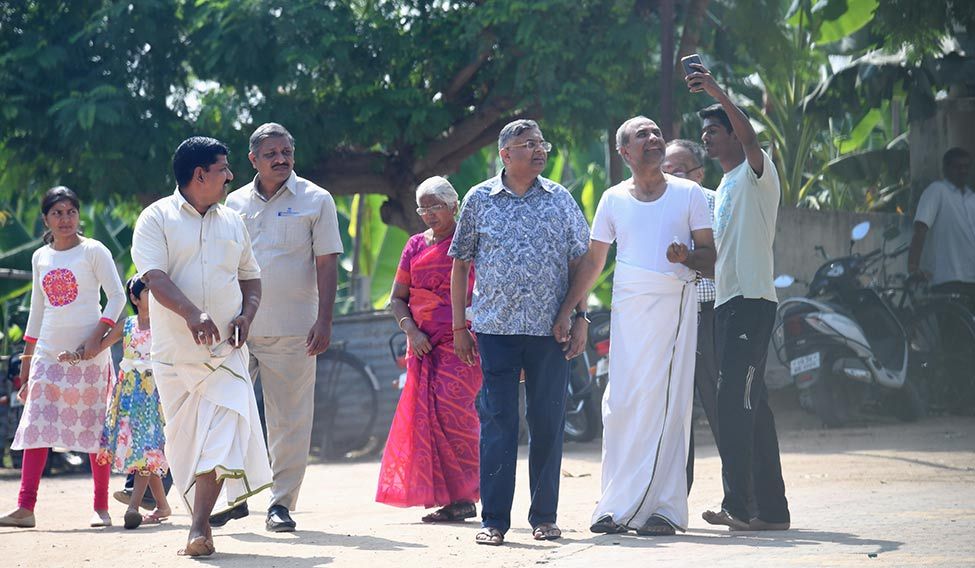 Family matters: Chandrasekaran with his relatives and villagers at Mohanur.
Family matters: Chandrasekaran with his relatives and villagers at Mohanur.
He was a good student, and he excelled in mathematics. “We used to walk four kilometres every day to the school,” said P. Narendran, an insurance agent who was Chandra’s classmate. “Those were the days when the Cauvery was bountiful, and it was green everywhere. We used to take a dip in the river before setting out to school.”
Chandra has run marathons around the world, including Amsterdam, Boston, Chicago, Berlin, Mumbai, New York and Tokyo. Ajeethan said the foundation was laid at school. “Our physical training teacher would make us run 400 metres every day. This must have made Chandra a dedicated marathon runner,” he said. Chandra took running seriously only in 2007 to improve his fitness (he has a family history of diabetes), but he has always been interested in sports. Narendran said they used to play cricket in the ground opposite Chandra’s farm in Mohanur. Chandra was a left-handed batsman and a spinner. “He was the captain of our agraharam cricket team,” said Narendran.

Chandra and his brothers went to the Tamil-medium government school in his village till the 10th standard. He studied in the English medium in higher secondary and graduated from Coimbatore Institute of Technology in applied sciences. After that he went back home with the intention of taking up farming. He tried it for six months, and, in between, thought of taking up chartered accountancy. But, M. Gurusamy, principal of Coimbatore Institute of Technology, advised him to do master’s in computer application. “I told him to take up computer applications when he was seriously considering taking up agriculture as his profession. He excelled in all the subjects in MCA,” said Gurusamy.
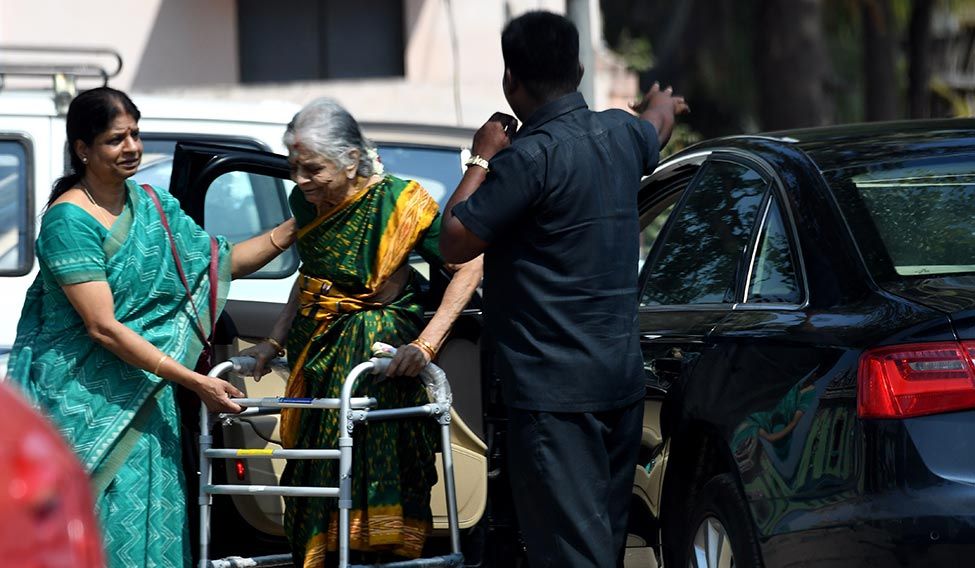 Chandrasekaran's sister Mathangi and mother Meenakshi.
Chandrasekaran's sister Mathangi and mother Meenakshi.
Those were the days when computer application was in its nascent stages, and Chandra told his father computer science was his cup of tea, rather than banana cultivation. Natarajan quickly agreed. Chandra joined the first MCA batch at the Regional Engineering College (National Institute of Technology) in Tiruchirappalli, and completed the course in 1986. In the final year, he took up a project at Tata Consultancy Services.
Natarajan continues to be the biggest influence in Chandra’s life. And it does not take long to figure out where his value system comes from. “I am very happy for him,” said the 84-year-old proud father. “It is all because of his hard work and adherence to values that made him what he is today.” Chandra’s brother Srinivasan said their parents instilled the values in them. “We had a humble beginning. We were always very determined, focused. My father always wanted us to lead a disciplined life,” he said.
Chandra is the youngest of three brothers and Srinivasan the eldest. The other brother, N. Ganapathy Subramaniam, is the chief operating officer of TCS. They had the freedom to choose what they studied, but maintaining good character and conduct was obligatory. “Wherever we were for our studies, we had the habit of coming back home every weekend,” said Srinivasan. Chandra’s wife, Lalitha, was an investment banker. They have a son, Pranav, 20.
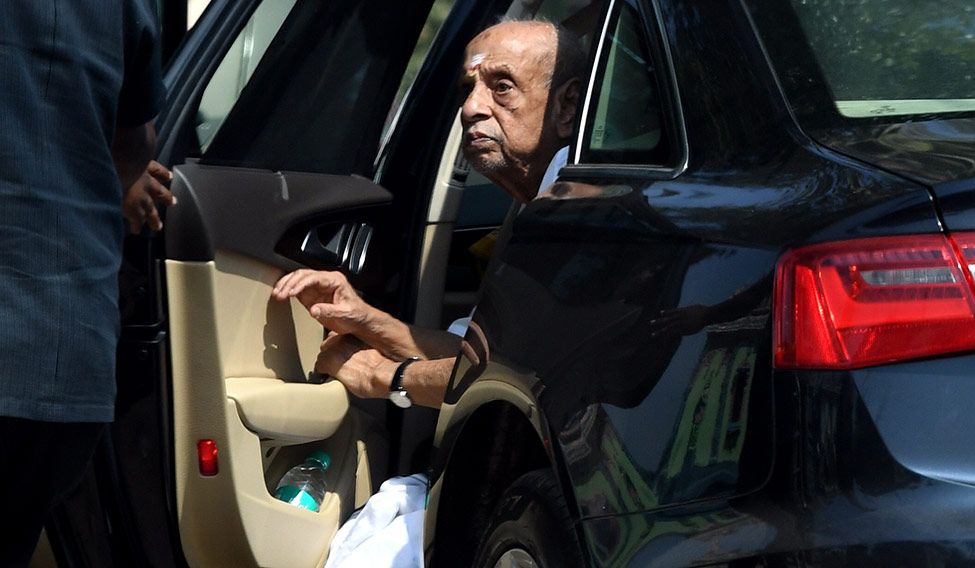 Chandrasekaran's father Natarajan.
Chandrasekaran's father Natarajan.
A firm believer, Chandra walked almost a kilometre to pray at the small Vinayaka temple in the village, then at the Achaladeepeshwar temple on the banks of the Cauvery and the Pransanna Venkataramanaswamy Perumal temple, with his parents, brother Subramaniam and brother-in-law Kasi Viswanathan, who is the managing director of Seshasayee Paper and Boards in Erode. Chandra had flown down from Mumbai to Coimbatore and reached Erode by road, where his parents lived at the Seshasayee Paper Boards quarters with his sister.
His family is both happy and concerned about the new job. “It is a kind of a mixed feeling for us,” said his cousin Ajeethan. “He has the best of responsibilities and along with the top job also is the risk of all the controversies over the past few months.” But no one has any doubt that Chandra is up to the task, as his ability to pace himself has been evident in his business approach all along. TCS had grown by leaps and bounds under him. And his ethics are as strong as his loyalty to the group.
Of Chandra’s many qualities, the most appreciated one, perhaps, has been his ability to be calm under pressure. It helped him steer TCS out of the effects of the global financial slowdown. And it would be his biggest asset in managing the behemoth that Tata Group is. Chandra’s favourite painting is that of a meditating Budhha seated near an elephant. It is his belief that the peaceful Buddha can always influence the giant creature with his calm and composure.
By Lakshmi Subramanian/ Photos by Bhanu Prakash Chandra

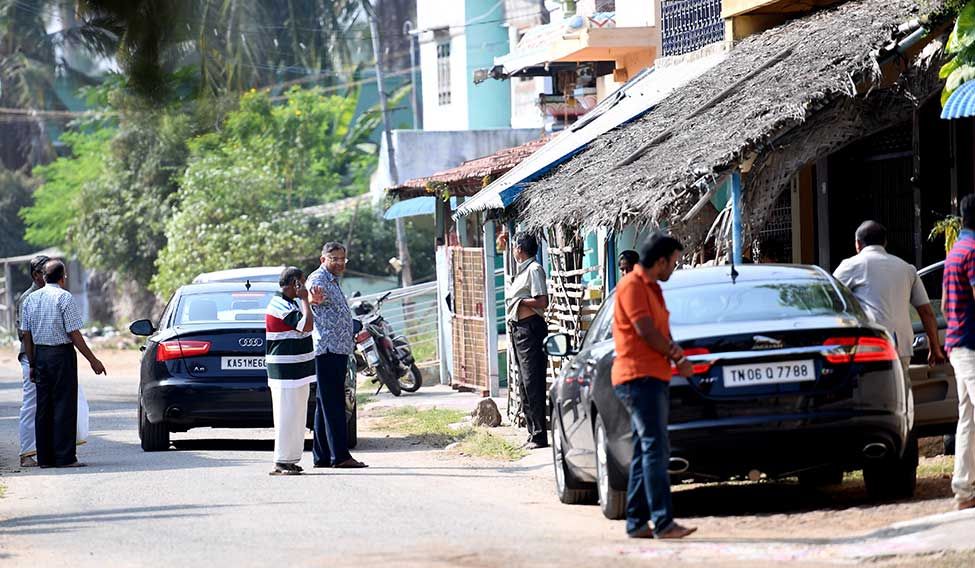

கருத்துகள்
கருத்துரையிடுக